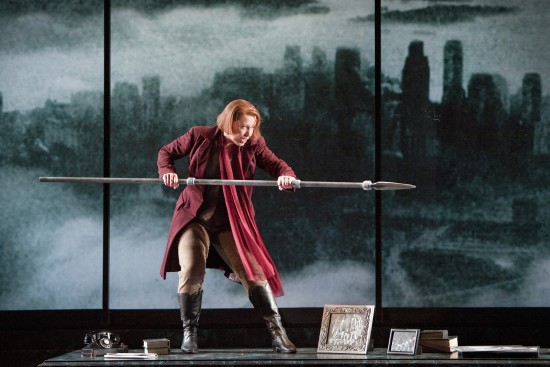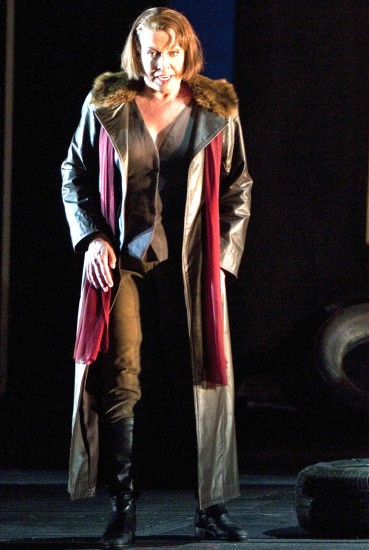The quick and easy answer to the title question is – Nina Stemme. More knowledgeable critics than I have praised her singing. For example, Richard Scheinin writes in the San Jose Mercury News, “She has been the cornerstone. She is a singer of arresting power and sheer delicacy, her voice both spacious and focused. And filled with color . . .”

And she is equally accomplished as an actress. In Act II of Die Walké¼re she bounds into Wotan (Mark Delavan)’s CEO office, every inch a teenage girl – infatuated with her father and on a different planet than her step-mother. At one point she jumps up on Wotan’s oversized conference table, mock-threatens him with his own spear, then jumps on his back, piggy-back style.

Later in the act she reveals herself to Siegmund (Brandon Jovanovich) as a warrior goddess and tells him he will die in battle and she will take him to Valhalla.

In the last act of the next opera, she does a marvelous job of portraying her internal battle between independence and love for Siegfried (Jay Hunter Morris)- a battle which ends with sweet surrender to the latter.

And she starts off the final opera with the same demonstration (even though Siegfried is now sung by Ian Storey).
Then, when Siegfried returns, disguised (by Tarnhelm) as Gunther she becomes the terrified helpless female but later turns into an unforgiving vengeful woman when she realizes that Siegfried “done her wrong.”

Finally, to top it off, she is the grieving widow and then the noble heroine. Stemme does it all!

Hagen (Andrea Silvestrelli) plots with Gutrune (Melissa Citro) to give the black magic potion to Siegfried
A couple of the other singers deserve special mention. Andrea Silvestrelli showed off his fine deep voice as Fasolt in Das Rheingold, but his Giant outfit limited his body language. However, in Gé¶tterdé¤mmerung he was bone-chilling as the evil Hagen.
In Scene 2 of Das Rheingold, Zambello depicts the Gods as a bunch of ordinary people who have been victims of the Peter Principle – they have risen to their level of incompetence. However Stefan Margita does a wonderful job both vocally and visually of portraying the demi-god Loge as an extremely capable shyster lawyer. He has no illusions about people, Gods, or anything else.
Although it was only a bit part, Stacey Tappan captured my heart with her depiction of the Forest Bird. Her voice was perfect for the part (as it was for one of the three Rhine Maidens), and she hopped from place to place and cocked her head exactly the way a robin hops across a lawn listening for a worm.
So far I’ve just talked about some of the parts that made this production so great. But in a good production of an opera the whole opera is greater than the sum of its parts; and in a good production of the Ring cycle, the whole cycle is greater than the sum of the four operas. I said quite a bit about Zambello in Part II, but the contribution of Donald Runnicles to the overall effect of the Ring deserves at least equal mention.
As we were walking out of Das Rheingold on the first night, Letha Ann said that she was disappointed in his conducting: “It lacked fire,” she said. I had been completely entranced by all the visuals, but on reflection I realized that I had hardly noticed the music – which is not good when the music is by Wagner. So we entered Die Walké¼re the next night with a bit of trepidation. It was rapidly dispelled. From the overture on the orchestra caught fire. It was always in perfect alignment with the action: dramatic where the action was dramatic, tender where the action was tender, thoughtful where the action was thoughtful, . . . .
At Friday night’s Siegfried the fire continued where it had left off – was even better if that were possible. And the Sunday matinee performance of Gé¶tterdé¤mmerung simply blew my mind. And that opinion was shared by the entire audience.
As all opera-goers know, when the conductor mounts the podium to begin the last act of an opera, he motions the orchestra to stand and receive the applause. Well, Sunday afternoon that applause was extra special. This was not only the third and final time today that Runnicles mounted the podium for Gé¶tterdé¤mmerung, it was the tenth and final time he mounted it this week for the Ring cycle, and (for all the cast and orchestra) it was the thirtieth time for this season. As Runnicles first came in view of members of the audience who could see the back of the orchestra pit, they started clapping and they started standing. The rest of us didn’t wait until we could see him. By the time he actually mounted the podium, every one of us was standing, clapping, and shouting.
I had never seen this before. And I had never felt it was so richly deserved.
An hour or so later, we stood again and we applauded again as the final curtain came down on a once-in-a-lifetime experience. Later we walked to nearby Inn at the Opera where it took us almost an hour nursing a glass of wine before we unwound enough to even look at the menu. A fitting end to a wonderful week.
The Opera Nut
Photos by Cory Weaver
This review by Philip G Hodge appeared in sanfranciscosplash.com on July 19, 2011



